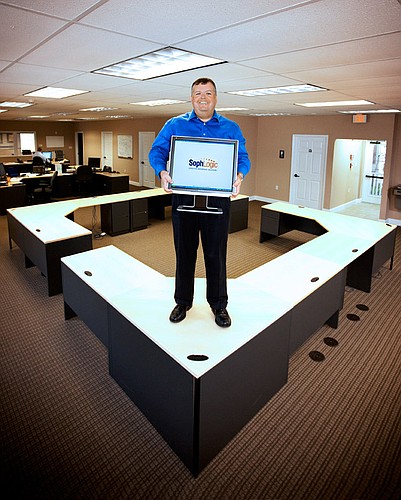- July 26, 2024
-
-
Loading

Loading

As a small business owner that sells high-end computer products and services to other businesses, Michael Bovaird has been on the front lines of many recession battles lately.
Six months or more ago, he says, the big fight was to convince potential clients to spend less time thinking about buying products and more time actually buying stuff — a similar issue confronting everyone from car salesman to homebuilders. Nowadays, that problem has grown even worse: The time to make a decision is still long, Bovaird reports, and now many customers are opting for the less expensive option, too.
“We are seeing companies make a price buy,” says Bovaird, president of Lakewood Ranch-based SophLogic. And, true to the salesman's creed, he contends that companies that buy on price on products such as computer networks and software systems are sacrificing long-term values for short-term savings.
It makes sense, then, that finding a way to get customers to go for the higher-priced option has become Bovaird's number one mission at SophLogic, a 16-employee firm that reported $12.10 million in 2008 revenues. It's a delicate balance, as Bovaird says everyday he deals with companies that have shrinking budgets.
“We don't want to sell someone something and have the customer hate us down the road,” says Bovaird. “We want to make [the products] fit their business needs today, tomorrow and five years from now.”
Bovaird, a native of Calgary, Canada who moved to the Bradenton-area in 2004, takes a full-throttle approach to executing that strategy. SophLogic, for example, performs what Bovaird calls a free “scoping exercise” for each potential client.
The exercise includes looking at every aspect of a company's operations so SophLogic can provide a return on investment analysis before it sells anything. It's a time consuming and sometimes expensive process, says Bovaird, but one he believes is crucial to building good client relationships.
So far, despite all of the sales challenges, the recession hasn't dented SophLogic. The company actually grew revenues 40.7% in 2008, from $8.6 million in 2007 to the $12.10 million figure last year. But Bovaird is projecting a flattening of revenues for the foreseeable future, at least until the economy rebounds.
Bovaird founded SophLogic in 1998 as a staffing company, with the goal of matching computer experts with companies in need of consulting assistance on in-house software and networking programs.
While that approach worked well, Bovaird eventually wanted to diversify. So in 2007 he launched a sales unit to become a reseller of SAP software and related products. The idea was to form a two-pronged business, where, according to Bovaird, “the staffing side helps the companies that have bought it and the sell side helps people who need to buy it.”
That strategy is similar to Bovaird's first go-around in the software and technology industry. That occurred in the early 1990s, when two friends recruited Bovaird, who then worked for American Airlines, to their fledgling Toronto-based software staffing company, OmniLogic.
Within a few years, OmniLogic had moved into the software sales arena and reached $95 million in annual sales, success that attracted potential suitors; PriceWaterhouse Canada ultimately bought the company.
Bovaird, however, wanted to stay in an entrepreneurial setting. So he took his payout from that deal and used it to help found SophLogic. He moved the company to the Bradenton area in 2004, he says, for a combination of the warmer weather and a better job applicant pool.
Now, after being in the United States for five years, Bovaird has picked up on a new trend he thought he left behind in his more left-leaning homeland: The government handout. He says he's no socialist, but he still wants in.
“It would be nice to see the federal government help small businesses,” Bovaird says. “We see the banks getting bailouts and the auto companies getting bailouts, but we're not seeing a lot of help for small businesses.”